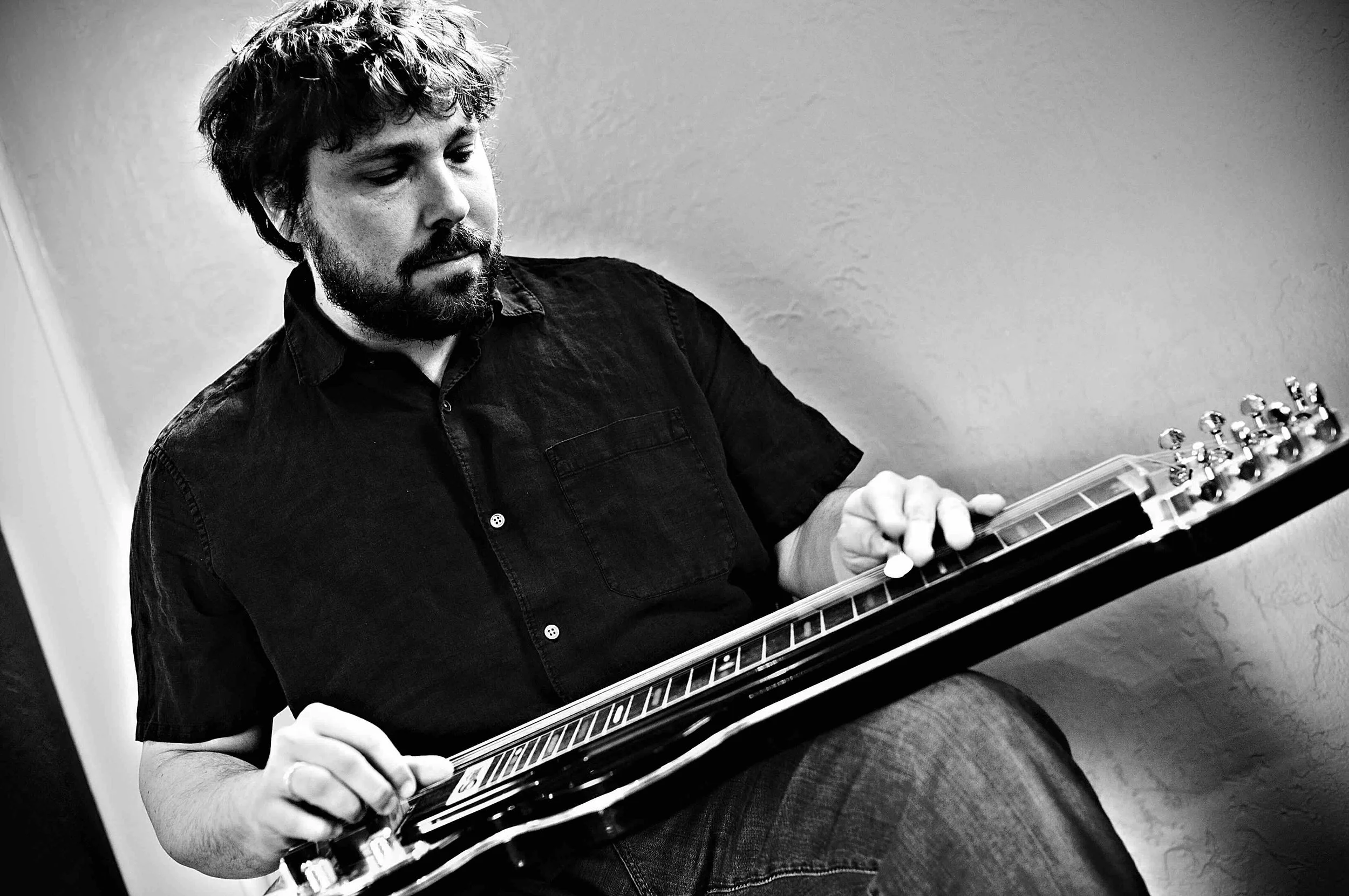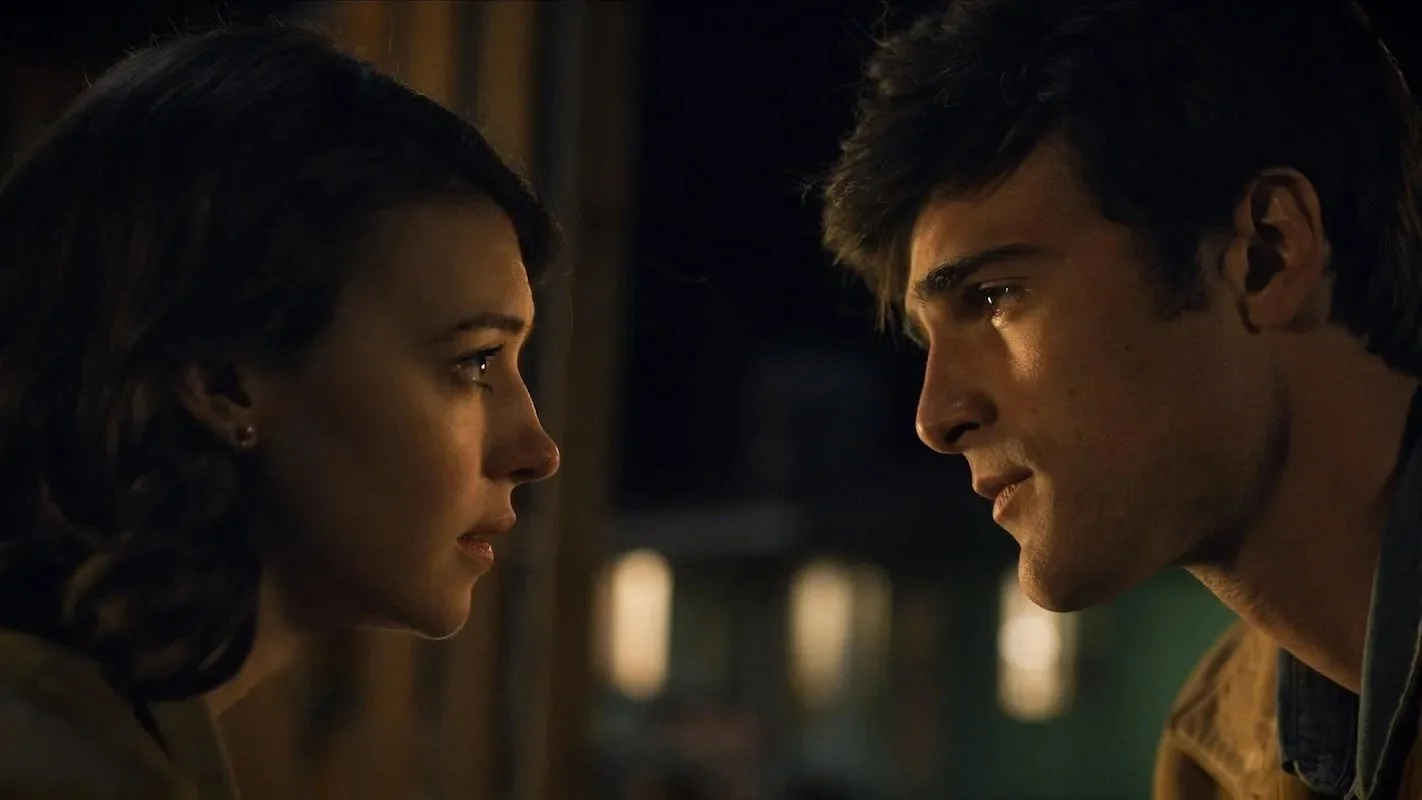Composer Mark Orton Talks Sweeping, Dangerous Romance of “On Swift Horses”
Based on Shannon Pufahl’s novel of the same name, On Swift Horses is a return to the sweeping Hollywood romances of yesteryear. In the 1950s, Muriel (Daisy Edgar-Jones) and Julius (Jacob Elordi) find themselves at a crossroads. Julius has just returned from the Korean War and is struggling to find his place in the world. Muriel is married to Julius’ brother (Will Poulter) and longs for a life beyond that of a stay-at-home wife. Muriel and Julius, separately, fall into the dangerous world of gambling while also acting on their hidden, queer desires.
All of these swirling emotions are tracked through Mark Orton’s lush score. Inspired by the American West and the inherent love and danger in Muriel and Julius’ lives, Orton’s score will make you fall in love in an instant. Orton sat down with Beyond the Cinerama Dome to discuss his musical roots, his use of antique instruments, and the challenges of balancing love and fear. This transcript has been edited for length and clarity.
Beyond the Cinerama Dome: I always like to start with your musical beginning, and then how you realized the film scoring world was what you wanted to put your focus into.
Mark Orton: I grew up in a musical family. My dad was a conductor, so there was music from the get-go. I started playing piano when I was super young, and there were musicians around the house all the time.
I switched from piano to guitar at five years old and got much more serious with guitar, although I kind of kept piano going. As time went on, my dad collected some instruments. More than that, I would hang around his heels in orchestra rehearsals and get to go play some instrument or another. That's really where it started out.
I grew up in Stony Brook on Long Island in New York. Our high school had a fantastic music program. There were several orchestras and jazz ensembles within one high school. The top jazz ensemble was playing nationally in competitions. One of my best friends was a fantastic jazz guitar player. I didn't have those chops developed, but the leader of the band, this was around 11th grade, had said, look, I know you play piano and we don't have somebody in the piano spot. If you study with this guy over the summer, then I'll set you up in the ensemble.
The guy he set me up with is a composer named Danny Deutsch. A fantastic musician and a great educator. We studied that summer, and that was when things really turned for me. He became my mentor. He knows as much about Elliott Carter and heavy classical stuff as he does about Afropop, soul, and just world music in general. He turned me on to all kinds of other stuff and then also got me composing for real.
To the heart of your question, I did connect with some student directors and did some work like that. I also did other media or other visual work, some more experimental stuff and some weird theater stuff. After I got out of school, I had two very close friends, and we had decided to move cross-country together. They had also been to music schools, and we formed this kind of little chamber group together. That was my first career. That group, called Tin Hat Trio, ended up getting signed and touring overseas and in the States.
The main thing is that the group's music was licensed into film all the time. Rather than going to USC, getting a gig like making coffee or doing some assistant work for an established composer to work my way up the studio, I really came in sideways. I was getting my music licensed a lot.
The chapter I left out was that I had been an engineer. I ran the Knitting Factory in New York. I toured with a lot of those artists like the Lounge Lizards, a bunch of those groups. Technically, I had an orchestral background and I was a performer, but I also understood the engineering side of things.
Courtesy of Mark Orton
It just was sort of an organic thing where they'd ask me if I could edit this way or that way, or create a slightly different instrumentation. I would raise my hand and say that's something I can do. I can handle the engineering, the editing, I can handle orchestration and classical chops. I can do performative stuff. I can flesh it out, add strings to it, I can make it bigger, and then eventually I can also score your film.
That all coincided with the fact that, to be honest, I wanted more normalcy in my life. I'd been touring as an engineer really extensively for several years. Then I got my own band signed and we toured like crazy. I just spent all this time on the road and I really kind of burned out on it. I thought, at the time, that being a film composer might bring some more normalcy, which it did in some ways. I at least stay home. Even if I'm in my studio for 18 hours a day, I'm at least home.
What was something about the On Swift Horses project that you thought would be an exciting challenge or something new that you would get to do with the film?
In some ways, this kind of old-school romantic drama is what I always imagined doing as a composer. I really love schmaltzy music. I love going for romance and that big relationship drama that's happening in this film. The tension, the butterflies in the stomach, all the stuff with these love affairs that are happening. Also, because it's in the 1950s, these relationships carry an element of danger and risk because they're same-sex relationships. It's a great scoring challenge, and not one that I got early on a lot. The harkening back to some of the classic Hollywood romantic drama stuff was totally fun and a bit different.
The only other sort of side of that is there's a lot of pretty intense physical sex scenes, and I haven't scored a lot of those either. The director, Daniel Minahan, he’s also done Fellow Travelers and Game of Thrones, so he knows his way around some get-togethers, let's say (laughs).
He was great and he gave me some great directives with it. Like remembering to keep the feeling you get when you're meeting someone new. The rush of emotion and what even a single glance can do.
Courtesy of Mark Orton
I got to interview Luc Montpellier, the cinematographer, back when it premiered at TIFF. One of the things he mentioned wanting to do with the images, and I'm curious if it came into the score too, was blending the classic Americana feeling and look with queer stories that aren’t normally put in this light.
It was a funny thing. It was sort of a balancing act that way because Daniel made it clear from the beginning that he did not want it to feel like a period film. This is not Ken Burns. We didn't have to be so legit 1950s. It was really about the characters, the kind of overall narrative arc, and, most importantly to him, was this idea that at all times, while we might be scoring a scene about young love, there's real danger and risk, and that has to be reflected in the music. As much as you can get lost in the moment, there has to be an undercurrent in the music that describes the fact that, at any moment, this might come apart. Not just that love is lost, but that life could also be lost. It carries true risk. I think that was more of the approach.
I favor a more organic approach instrumentation-wise. I think that makes it easier in terms of not betraying a time period. It's not like I've got some lush ’90s synth things happening all of a sudden in the sex scene or whatever (laughs). We're keeping it on the organic side.
There's a passage of the film where Jacob Elordi's character, Julius, is really falling for a man named Henry (Diego Calva). Besides just taking the risk of having a gay relationship at that time period, they're also doing some crazy gambling schemes. Daniel really wanted it to be just this incredible amount of excitement and sort of wildness, almost-coming-apart risk taking. All of those are the kinds of subjective terms he would throw in to alter the music.
If I did something that was a straighter, here's some 1950s guitar or whatever, he just said it really doesn't matter. We don't need to stick to that. I would rather it capture the emotion and not think so much about the tone of a 1954 Gibson guitar.
Sony Pictures Classics
As you pointed out, there are two types of danger. There's the danger of just losing a romantic relationship, but then also the danger of being found out and the violent ramifications that come from that. Do you feel like you scored those two senses of danger in different ways?
That definitely was my goal. In some ways,there's a palette for love and a palette for the risk that love carries. There's the heartbreak palette and the loss palette. But again, I think what I'm doing with the undercurrent through it all has less control. I'm using a lot of extended techniques on instrumentation. Doing things that aren't kind of the standard sound.
I think that is what’s signifying the inherent risk that danger is there at all times. I think that's the way I went after it. It's just something that's kind of tucked into the texture that brings a little bit of uneasiness, even as there's burgeoning love happening at the same time.
I read that you collect antique and unusual instruments. Did any of those make their way into On Swift Horses?
There's one instrument I have that's an old piano with incredibly soft felt. Super-spongy sounding rather than an attacking, crisp piano. A number of the main themes are played on that.
I've got some weird old autoharp-like things, and some of those instruments make their way in, but they're going to be built into the textures rather than a feature. I don't have any autoharp solos.
I do play some old guitars, some loud guitars that are from the ’30s, ’40s. My main acoustic guitar is from the 1890s, so, yes, okay, there are some antiques (laughs).
Support Your Local Film Critic!
~
Support Your Local Film Critic! ~
Beyond the Cinerama Dome is run by one perpetually tired film critic
and her anxious emotional support chihuahua named Frankie.
Your kind donation means Frankie doesn’t need to get a job…yet.
Follow me on BlueSky, Instagram, Letterboxd, YouTube, & Facebook. Check out Movies with My Dad, a new podcast recorded on the car ride home from the movies.



